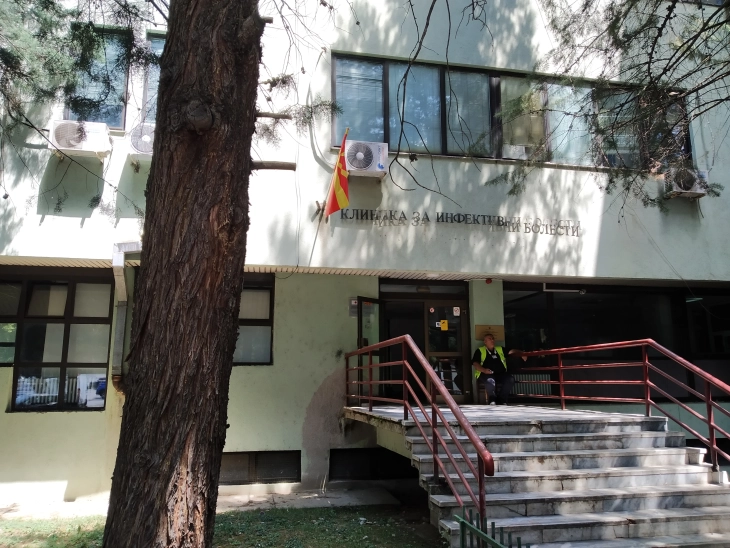Stevanovikj: Crimean–Congo hemorrhagic fever antiviral available in case we need it
- Through the World Health Organization and Doctors Without Borders, the country has obtained the antiviral drug recommended for the treatment of Crimean–Congo hemorrhagic fever, and the medical worker hospitalized with the disease is currently stable, University Clinic For Infectious Diseases and Febrile Conditions director Milena Stevanovikj told MIA.
- Post By Magdalena Reed
- 15:08, 9 August, 2023

Skopje, 9 August 2023 (MIA) — Through the World Health Organization and Doctors Without Borders, the country has obtained the antiviral drug recommended for the treatment of Crimean–Congo hemorrhagic fever, and the medical worker hospitalized with the disease is currently stable, University Clinic For Infectious Diseases and Febrile Conditions director Milena Stevanovikj told MIA.
"We immediately procured this drug, which is very rare and available only in countries with high numbers of sick patients. But in cooperation with the World Health Organization and Doctors Without Borders, we managed to get a quantity of the drug in a very short time, in case we need it for our patient," Stevanovikj said.
She said the antiviral medication was to be administered only if a patient had "an extremely severe clinical picture."
"We used to administer it when treating chronic hepatitis C, a long time ago. It is not a drug that is specific to Crimean–Congo [hemorrhagic fever]. But our colleagues who treat Crimean–Congo [hemorrhagic fever] around the world, in endemic areas with a high number of patients, sometimes use it in very severe clinical cases, as a treatment option," Stevanovikj said.
She confirmed that the infected nurse was stable and being monitored.
Earlier on Wednesday, Infectious Diseases Clinic representatives said after the first reported case of Crimean–Congo hemorrhagic fever in decades, the country's health institutions had reacted promptly.
"The patient, who was infected on the job, is stable with an intermittent fever and no other symptoms of illness. Her blood tests are being monitored daily and therapy is being prescribed," they said.
"In the next few days, according to the course of the disease, we expect a phase in which her condition may worsen."
Also, they said, after obtaining the antiviral medication on Tuesday, doctors from the Infectious Diseases Clinic held online meetings with their international colleagues with extensive experience in treating Crimean–Congo hemorrhagic fever.
The first recent reported case of Crimean–Congo hemorrhagic fever was a 27-year-old woman from the village of Kuchica in the Shtip municipality of Karbinci. Her initial symptoms started on July 21, after she had been bitten by a tick two days earlier. She was hospitalized on July 23 and died on July 30.
On Tuesday, Commission for Infectious Diseases chair Zlate Mehmedovikj told MIA that there was no need for panic as more cases of Crimean–Congo hemorrhagic fever were not expected in the near future.
The first case was a case of direct infection and the secondary case was probably caused by handling contaminated blood, Mehmedovikj said.
According to studies published by the National Library of Medicine at the US National Institutes of Health, Crimean–Congo hemorrhagic fever is a zoonotic viral disease caused by a tick-borne virus endemic in Africa, Asia, Eastern Europe and the Middle East. The viral infection has a fatality rate of up to 50% during outbreaks.
The disease is generally asymptomatic in infected animals but highly fatal in humans. The disease in humans begins as non-specific flu-like symptoms (fever, muscle aches, headache), which can lead to organ failure. Mortality is primarily caused by fulminant hepatitis, thrombocytopenia and massive bleeding.
The Crimean–Congo hemorrhagic fever virus is classified as a biosafety level 4 pathogen and it is advisable to manage patients with a suspected or confirmed diagnosis in high-level isolation units.
Secondary human-to-human transmission occurs through direct contact with the blood, secretions, organs, or other body fluids of infected persons. It has also been shown that the virus has the potential to be transmitted by aerosols.
"Supportive therapy is essential, since there is no effective specific aetiological treatment. Although its use is controversial as no conclusive studies have demonstrated its efficacy, in the most serious cases, it is advisable to use high-dose ribavirin. Other treatments, such as hyperimmune serum from convalescent patients, have not been shown to be useful. Furthermore, there are no vaccines with proven efficacy or safety in humans," according to a paper published by the US National Library of Medicine. mr/







